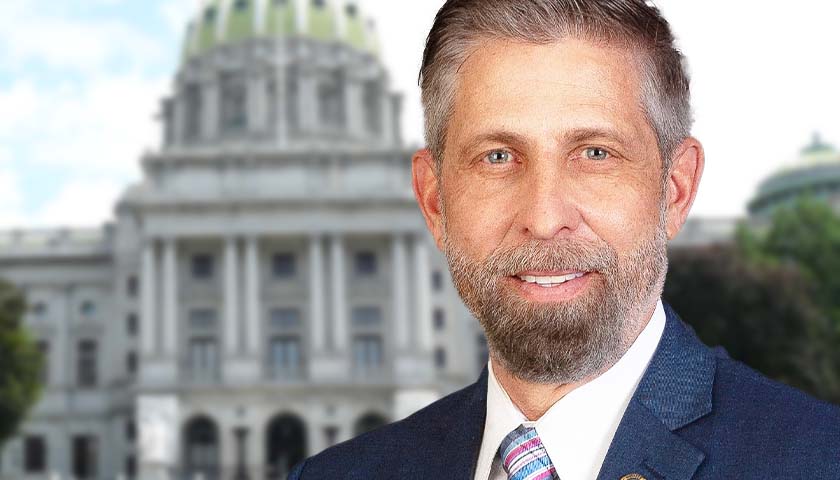Legislation currently in the works in the Pennsylvania General Assembly would spell out two rules for redistricting in the Keystone State: Elections cannot legally take place in outdated districts and courts can’t create new districts themselves.
In February 2018, the Democrat-controlled Pennsylvania Supreme Court not only struck down Pennsylvania’s congressional maps as unconstitutionally gerrymandered, it reimposed new maps created with no input from the legislature, something state law does not grant the court the right to do. The new maps strongly favored the Democrats’ electoral prospects.
The legislation now being drafted by State Rep. Craig Williams (R-Chadds Ford) chiefly aims to guarantee that no election districts’ borders are based on obsolete population figures. The Pennsylvania Constitution stipulates that districts are redrawn every 10 years following the release of such figures by the U.S. Census Bureau. But, secondarily, it would send a message to judges: You’re not in the redistricting business.
“Fair and proportional representation requires that state and federal legislative districts be constructed, published, and adjudicated with all possible haste so that voters have certainty about their districts as soon as possible,” Williams wrote in a memorandum on his upcoming bill. “I also intend to reaffirm statutorily that the General Assembly cedes none of its express constitutional authority to the courts for creating maps for either state or federal legislative districts.”
When the Pennsylvania Supreme Court decided, six years after congressional districts were last reshaped, that the congressional districts hammered out by the GOP-led state legislature were products of partisan gerrymandering designed to help one party, they had some precedent on which to rely. In 2012, the court ruled that the General Assembly had enacted improper maps for its own districts.
But unlike the court’s 2012 decision, which ascribed the responsibility of readjusting electoral maps to the state lawmakers, the 2018 ruling resulted in the justices themselves directing the congressional redistricting process. The majority reasoned that the court could assume the task if the legislature did not do so in a timely fashion.
“When, however, the legislature is unable or chooses not to act, it becomes the judiciary’s role to determine the appropriate redistricting plan,” Justice Debra McCloskey Todd (D) wrote on behalf of the court.
Plaintiffs in the latter lawsuit included the liberal League of Women Voters and 18 individuals—one registered Democrat from each of Pennsylvania’s congressional districts. The four justices who voted to allow the court to redraw the congressional maps were all Democrats. The dissent, by contrast, was bipartisan; it included the court’s two Republicans, Chief Justice Thomas G. Saylor and Associate Justice Sallie Updke Mundy as well as Justice Max Baer (D).
In his dissent, Saylor emphasized that the redistricting process—because it’s entrusted to lawmakers—is inherently political. He added that, while the judiciary may decide that a redistricting plan skews too unfairly toward the advantage of one political party, the U.S. Supreme Court advised in a 2004 Colorado case against judges becoming overzealous in making such rulings.
Saylor thus quoted U.S. Supreme Court Justice Anthony Kennedy: “A decision ordering the correction of all election district lines drawn for partisan reasons would commit federal and state courts to unprecedented intervention in the American political process, [yielding] substantial intrusion into the Nation’s political life.”
After the Pennsylvania Supreme Court made its 2018 ruling, many conservatives and Republicans reacted with outrage. State Rep. Cris Dush (R-Wellsboro) introduced impeachment resolutions against Todd and her three Democratic colleagues who joined her ruling: David N. Wecht, Christine L. Donohue and Kevin M. Dougherty.
“This Order overrides the express legislative and executive authority, found in Article IV, Section 15 of the Pennsylvania Constitution, concerning the Governor’s veto authority and the General Assembly’s subsequent authority to override such a veto,” Dush then wrote in a memo to colleagues. He went on to say the justices who joined the majority opinion “engaged in misbehavior in office.”
Republican legislators appealed the state court’s decision to the U.S. Supreme Court, but the latter chose not to intervene.
– – –
Bradley Vasoli is a reporter at The Tennessee Star and The Star News Network. Follow Brad on Twitter at @BVasoli. Email tips to [email protected].
Photo “Craig Williams: by PA State Rep. Craig Williams. Background “Pennsylvania Capitol” by Ad Meskens. CC BY-SA 3.0.





